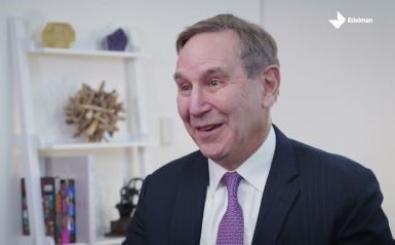As energy prices soar, inflation rises, the Russian war on Ukraine persists and communities face the dire economic aftermath of the pandemic, the 2022 Edelman Trust Barometer shows that a cycle of distrust looms across the international stage.
Launched during a hybrid event in Brussels on 28 April, the Barometer indicates the trust vacuum at EU level is mainly fuelled by government and media – seen as divisive forces. By contrast, businesses and NGOs emerge as the first and second most trustworthy institutions, rising above distrust levels with 54% and 51% respectively.
In particular, findings show that citizens expect more business leadership, hoping to see tangible progress. While there is always room for improvement, this highlights a great opportunity for businesses to enact positive change and rebuild trust, which will require effort and dedication.
As the current geopolitical context fuels widespread worry and instability, this is a crucial point in time for institutions and societal leaders to take action and provide truthful quality information. Currently, the majority of people globally (76%) are concerned about false information being used as a weapon against their country, ultimately destabilizing economies.
Linda McAvan, Executive Director at the European Climate Foundation, suggested that the drop in trust in government and media is not surprising. Referring to the lure of populism, she explained:

She concluded by saying that “people instinctively don’t believe what they see, and all of us, across all the sectors, should be reflecting very deeply about this.”
Businesses and NGOs expected to take the lead
Interestingly enough, after many months of lockdowns and remote interactions, the workplace has become an increasingly important realm in the lives of European citizens, with 74% of respondents expressing trust in their employers. In parallel, co-workers and colleagues emerge as the second most trusted figure to act as societal leaders in the EU – directly after scientists who maintain their first position for the third year in a row, most probably due to their factual and straightforward narrative and approach during the health crisis. Antoine Harary, Global Managing Director and COO at Edelman Data & Intelligence (DXI), highlighted the opportunity and responsibility for businesses to take the lead in building trust, reunifying society, and delivering results where other institutions seem to be failing. “Rebuilding trust must happen at the nexus of businesses, NGOs, and civil society working together. We need to restore trust as a collective”.

The Trust Barometer shows that EU citizens expect businesses (45%) and NGOs (44%) to take a leadership role in solving global societal issues – with government and media falling below the 40% threshold. Businesses are also first in line with 58% of respondents trusting in their abilities to achieve results and successfully execute strategies to do so. While NGOs are seen as the most ethical and trustworthy entities of all, 51% of respondents doubt their competence to effectively deliver results.
In light of this and referring to the road ahead, Karin Svensson, Chief Sustainability Officer at Volvo Group, humbly suggested:

Divided audiences
This year’s findings also highlight a record trust gap between high- and low-income populations in Europe, most likely caused by the cost-of-living crisis and the overall economic and health impacts caused by the pandemic. While trust levels among higher-income groups have been growing steadily for the past decade, lower-income populations experienced a stark drop as they battle increased inequality and unfavorable economic conditions. Olaf Steenfadt, Director at Reporters Without Borders, tied this inequality back to the concern around false information, insisting that:

Also feeding into the divide is the conviction held by 65% of respondents that there is a real inability to have constructive and civil debates about issues society disagrees on. For countries with political systems that value and promote civil and constructive public discussions – specifically Western-style democracies – this is a critical warning sign.
In fact, democracies such as Germany, the Netherlands, and the U.S. have experienced a steep decline in trust levels. Conversely, more centralized and growing economies are currently geared toward progress and are therefore in the process of building trust. The recent successes of populist, or more authoritative figures, seemingly comes down to their attitude of "getting things done" and cutting through the myriad of empty promises. Calling for a reality check, Olaf Steenfadt raised that “the demand for easy answers is a very human thing”, especially in an increasingly complex environment. “Any fix to distrust starts with humility and in other words, a deep look into the mirror.”
What’s next?
With ever-present cycles of distrust and growing levels of fear, institutions will need to focus on long-term perspectives, thorough self-assessments, and transparency to address and solve societal issues that lie ahead. In his concluding remarks, Stefan Borst insisted he was hopeful that democratic leaders would find a way to rebuild trust by focusing on the three main pillars of “communicating effectively, smart listening, and ultimately, delivering on their promises.”






